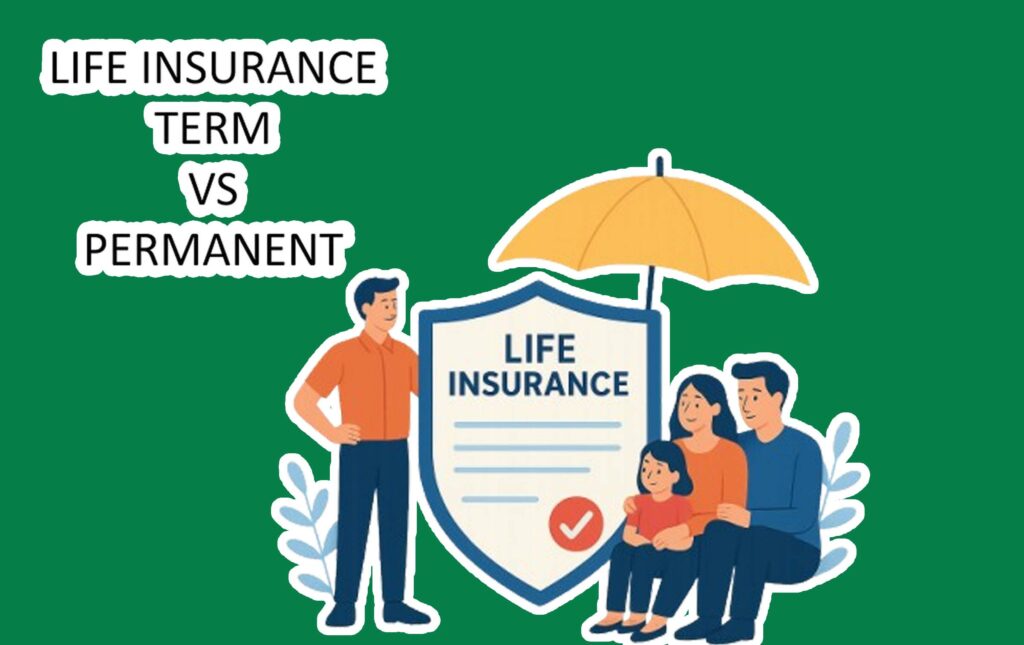Term Life Insurance vs. Permanent Life Insurance – Life insurance is one of the most important tools for financial planning, yet many people struggle to decide which type of coverage best fits their needs. The two most common options are term life insurance and permanent life insurance.

While both provide a safety net for your loved ones, they differ significantly in cost, duration, and additional benefits. Understanding these differences can help you make a choice that aligns with your financial goals.
What is Term Life Insurance?
Term life insurance is designed to provide coverage for a specific period of time, usually 10, 20, or 30 years. If the insured person passes away during this period, the policy pays out a death benefit to the beneficiaries. If the term ends and the insured is still alive, the coverage simply expires unless it is renewed or converted into a permanent policy.
The appeal of term life lies in its affordability. Premiums are relatively low, making it accessible for young families and individuals who want protection without straining their budgets. However, term life insurance does not build cash value—it is strictly protection, with no savings or investment component.
What is Permanent Life Insurance?
Permanent life insurance, unlike term insurance, provides lifelong coverage as long as the premiums are paid. It also includes a savings element called cash value, which grows over time and can be borrowed against or withdrawn. There are different forms of permanent insurance, including whole life, universal life, and variable life.
Whole life insurance offers fixed premiums and guaranteed cash value growth, making it stable but more expensive. Universal life gives flexibility in premium payments and death benefits, while variable life allows investment in sub-accounts that could grow faster but carry more risk. The key advantage is that permanent insurance not only offers lifelong protection but also acts as a financial asset. The drawback is that premiums can be several times higher than those for a term policy with the same death benefit.
Term Life Insurance vs. Permanent Life Insurance
The main difference between the two lies in duration and cost. Term life is temporary, inexpensive, and best for needs that will eventually end, such as paying off a mortgage or supporting children until they become financially independent. Permanent life insurance is more of a lifelong commitment, offering coverage that never expires and the added benefit of cash value accumulation, but at a much higher cost.
For example, a healthy 30-year-old might pay about $20 a month for a 20-year, $500,000 term policy. The same coverage under a whole life policy could cost upwards of $200 a month. This difference explains why many families opt for term life during their most financially demanding years, while those with long-term wealth or estate planning needs often consider permanent insurance.
Which One is Right for You?
The choice comes down to your financial priorities. If you are looking for affordable protection for a specific period—say, until your children graduate or your mortgage is paid—term life is usually the better fit. It gives you peace of mind without locking you into high premiums.
On the other hand, if you want lifetime coverage, plan to use life insurance as a wealth-building tool, or need it for estate planning purposes, permanent insurance may be more suitable. Some people even choose a combination: term insurance for large, temporary needs, and permanent insurance for lifelong security and savings.
Final Thoughts
Both term and permanent life insurance are valuable, but they serve different purposes. Term life is simple, affordable, and effective for temporary needs, while permanent life is more expensive but provides lifetime coverage and an additional financial cushion. The best policy is the one that aligns with your current situation and future goals.
Before deciding, it is wise to evaluate your budget, family responsibilities, and long-term plans—or speak with a financial advisor to find a balance that works for you.



